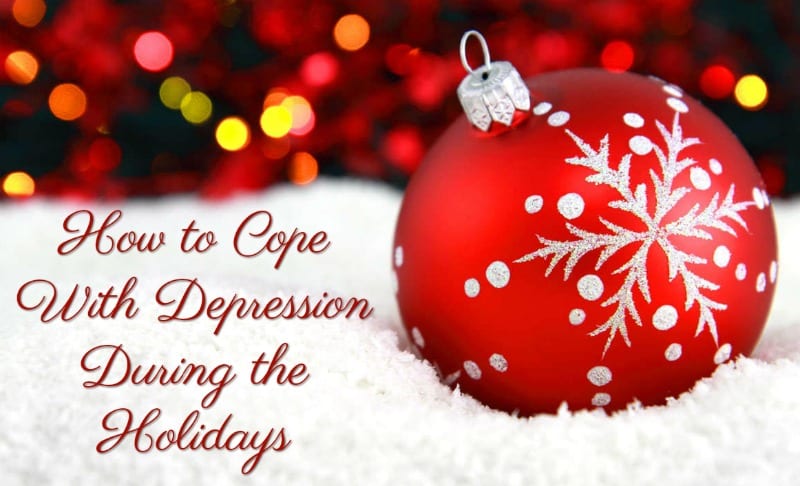The holidays are often the most wonderful time of the year. However, for many people, holiday cheer isn’t a given. Some people feel depressed, anxious, or stressed during this usually merry season.
Feeling down during the holidays can be tough, especially since you may feel out of step with the rest of the world. Between end-of-year deadlines, family problems, a loss of a loved one, poor eating and drinking habits, and cold and dark winter days, it’s easy for the holiday season to get people down. Constant reminders of others’ happiness can additionally serve as a painful reminder of what is lacking in your own life. For this reason, the holiday months can be a particularly difficult time of year for those dealing with stress, depression, or anxiety from a variety of sources.
Here are some of the triggers and risk factors of holiday depression, and how you can resolve them.
Setting up unrealistic expectations. Hoping for a picture-perfect holiday is setting yourself up for disappointment. People often have an anticipation or fantasy of the holiday that they see on TV or social media. The reality is, it’s never exactly as you envision and that can be disappointing.
- Solution: Don’t get hung up on what the holidays are supposed to be like and how you’re supposed to feel. Being mindful of what you do have to be thankful for can help combat feelings of disappointment. Realize that the holidays do end — and take stock of what you can be grateful for. Having gratitude is a good remedy against depression.
Social Isolation. Social isolation is one of the biggest predictors of depression, especially during the holidays. People who have feelings of disconnectedness often avoid social interactions at holiday time. Unfortunately, withdrawing often makes the feelings of loneliness and symptoms of depression worse.
- Solution: One of the best ways to deal with social isolation is to reach out to friends or family for support. You can also try talking to a therapist. They can help you figure out where your feelings come from and develop solutions to overcome them.
Doing too much. During the holidays, the pressure of doing everything can be enough to send anyone into a frenzy. And if you’re prone to anxiety and depression, stress and a lack of sleep can take a significant toll on your mood. A heightened pressure and fear of not getting everything done are some of the most common triggers for the holiday blues.
- Solution: Cut back on commitments. If you feel like you just can’t get through one more holiday gathering, it’s OK to sit them out. It’s also okay to ask for help with some things on your holiday to-do list or even leaving some things off the list this year. So what if you don’t get the lights on the roof this year? Give yourself a break. Worrying about the minor stuff will not add to your holiday spirit.
Comparing yourself to others. Both in real life and on social media, it can be difficult to avoid comparing yourself to others around the holidays. If you have a less-than-perfect family, a past trauma from this time of year, or just a less-than-full holiday dance card, comparing your holiday experience with other people’s is a recipe for increased sadness and isolation.
- Solution: Remind yourself that these comparisons tend to be skewed — and they tend to make us feel bad about ourselves. People’s foundation for comparison is not based in reality. Most families have issues and most people do not have the perfect Christmas that they would like to have or that they’d remember from their childhood.
Slacking on self-care. For many people, December is the busiest time of the year. When work pressures pile up and the calendar gets full with social obligations, the routines that normally keep us healthy and happy — yoga class, morning runs, healthy meals, a bubble bath — are usually the first thing to fall by the wayside.
- Solution: Make a conscious effort to do some of your normal self-care activities to keep anxiety at bay. Make some time for yourself. Spending just 15 minutes alone, without distractions, may refresh you enough to handle everything you need to do. Also, since holiday goodies are everywhere, try to avoid poor food or drink choices. Plan ahead for parties by filling up on healthy options at home first and avoid drinking as much as possible — alcohol is known to worsen symptoms of anxiety and depression. On the other hand, don’t beat yourself up if you go overboard on the cookie platter. Just get back on track the next day.

Experiencing Seasonal Affective Disorder (SAD). If you tend to start feeling down when winter approaches each year, and those negative feelings don’t go away after the holidays are over, you may have Seasonal Affective Disorder (SAD). Many people who think they are suffering from a case of holiday blues may actually be suffering from SAD, a form of depression that’s brought on by the change of seasons.
- Solution: SAD shouldn’t be dismissed as mere “winter blues” — talk to your doctor if you’re experiencing symptoms of the disorder to find a treatment that works for you. Try a sun lamp to improve your mood.
Poor sleep habits. Not only can sleep deprivation lead to irritability, but it can also increase the risk of depression. If you don’t sleep, you don’t have time to replenish brain cells, the brain stops functioning well, and one of the many factors that could lead to is depression. Holiday activities easily can interfere with your sleep schedule.
- Solution: Try to get to bed and wake up at approximately the same time every day; avoid large meals and physical activity within a few hours of bedtime; and make your bedroom a sleep sanctuary, free from TV or other distractions. Getting a good night’s sleep may seem like an impossible goal when you’re wide awake at 3 a.m., but you have much more control over the quality of your sleep than you realize.
Shopping overload. The number of gift options available for the average person can be overwhelming. Some people respond to choice overload by over analyzing their options in the search for the very best item. Research suggests that this coping style is linked to depression.
- Solution: If you’re already feeling overwhelmed, now is not the time to fret about finding the perfect gift for your great aunt or your mother-in-law. Try making a gift list before shopping to keep your choices in check. Also, remember: everybody likes a gift certificate.
Poor family relationships. Although unhappy relationships with anyone can cause depression, it tends to feel more overwhelming during the holidays, when you may be forced to interact with certain family members.
- Solution: Don’t worry about things beyond your control. Even if you know your uncle and dad get into a fight every holiday, remember your limits. You can’t control what your family does, but you can control your own reaction to the situation. Try to head off potential problems by thinking about what people or situations trigger your holiday stress and figuring out ways to avoid them. If seeing your aunt stresses you out, skip her New Year’s party or only attend for just a bit. Instead of staying in your childhood bedroom, check into a nearby hotel. You really have more control than you think.
More Ways to Cope
- Make new family traditions. If the prospect of the usual routine fills you with holiday dread, try something different. Have Thanksgiving at a restaurant or spend Christmas day at the movie theater. Start a new tradition and get your family to agree to skip gifts and donate money to a charity instead.
- Lean on your support system. If you’ve been depressed, you need a network of close friends or family to turn to when things get tough. During the holidays, take time to get together with your support team regularly.
- Volunteer. Sure, you may already have a tight schedule. But consider taking volunteering. You may find comfort knowing that you’re making a small dent in the lives of people who need help.
- Ask for help — but be specific. See if your spouse will lug out the decorations. Ask if your sister will host the holiday dinner. People may be more willing to help out than you expect; they just need some guidance from you on what to do.
- Find positive ways to remember loved ones. Holidays may remind you of the loved ones who aren’t around anymore. But instead of just feeling glum, do something active to celebrate their memory. For example, go out with your sisters to your mom’s favorite restaurant and give her a toast.
- Don’t stay longer than you want. Going to a party doesn’t obligate you to stay until the end. Instead, just drop by for a few minutes, say hello, and explain you have other obligations. Knowing you have a plan to leave can really ease your anxiety.
- Stay on schedule. As much as you possibly can, try to stick with your normal routine during the holidays. Don’t stay too late at parties. Don’t pull an all-nighter wrapping presents. Disrupting your schedule can make your mood deteriorate.
- Exercise. While you may not feel like you have the time to exercise during the holidays, the benefits are worth it.
- Schedule extra meetings with your therapist. To stay grounded, plan ahead and schedule some extra sessions during the holiday season or you could ask about the possibility of doing shorter phone sessions.
- Give yourself a break. The holidays can make some people dwell on their imperfections or their mistakes. This is not an easy time of year for a lot of people. Be gentle with yourself. It is the season of kindness and forgiveness, after all. Save some of it for yourself.
- Acknowledge your feelings. If someone close to you has recently died or you can’t be with loved ones, realize that it’s normal to feel sadness and grief. It’s OK to take time to cry or express your feelings. You can’t force yourself to be happy just because it’s the holiday season. There’s no one right way to feel.
- Set aside differences. Set aside grievances with family members until a more appropriate time for discussion. And be understanding if others get upset or distressed when something goes awry. Chances are they’re feeling the effects of the holidays too.
- Plan ahead. Set aside specific days for shopping, baking, visiting friends, and other activities. Plan your menus and then make your shopping list.
- Seek professional help. Despite your best efforts, you may find yourself feeling persistently sad or anxious, plagued by physical complaints, unable to sleep, irritable and hopeless, and unable to face routine chores. If these feelings last for a while, talk to your doctor or a mental health professional.
- Focus on what matters. The holidays shouldn’t be all about the presents, but sometimes it easy to lose sight of that. Rein in the stress (and cost) by organizing a gift exchange with friends or family, baking your gifts, or board games by the fire and focus on what is most important to you.
Don’t let the holidays become something you dread. Instead, take steps to prevent the stress and depression that can descend during the holidays. Learn to recognize your holiday triggers, such as financial pressures or personal demands, so you can combat them before they lead to a meltdown. With a little planning and some positive thinking, you can find peace and joy during the holidays.


Recent Comments